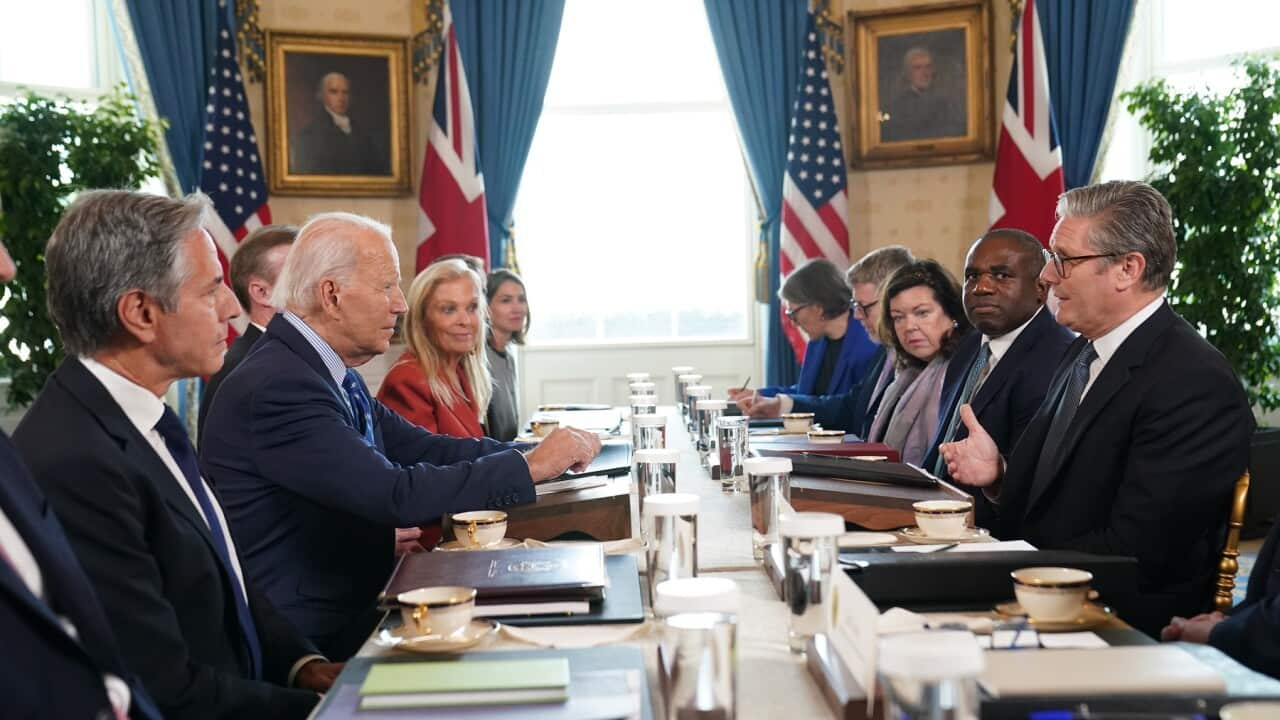TRANSCRIPT
The high stakes debate over whether Western nations should allow Ukraine to use their missiles to strike deep inside Russian territory continues after discussions between the United States and the United Kingdom.
President Joe Biden and Prime Minister Keir Starmer met in Washington to discuss Ukraine but held back from making a decision on the missile question.
President Biden nonetheless thanked Mr Starmer for the U-K's leadership, pledging to see Ukraine win back land seized in Russia's invasion.
"Mr Prime Minister, welcome. There's no issue of global consequence for the United States and Great Britain that we can't work together, haven't worked together. First, Ukraine. I want to thank you for the UK's leadership on this front. The United States is committed to standing with you to help Ukraine as a defence against Russia's onslaught of aggression. It's clear that Putin will not prevail in this war, the people of Ukraine will prevail."
Ukrainian President Volodymyr Zelenskyy has been urging NATO allies for months to permit the use of Western long-range missiles to target Russian military targets to damage their attack capabilities.
This comes as Ukraine continues to struggle to retake land taken by Russia in the country's east.
Russian President Vladimir Putin has issued a stark warning to the West that allowing Ukraine to use their missiles to strike Russia would be seen as an act of war by NATO.
"It is not about allowing the Ukrainian regime to strike Russia with these weapons or not. It is about making a decision about whether NATO countries are directly involved in the military conflict or not. If this decision is made, it will mean nothing less than the direct participation of NATO countries, the United States, and European countries in the war in Ukraine. This is their direct participation, and this, of course, significantly changes the very essence, the very nature of the conflict. This will mean that NATO countries, the United States, and European countries are fighting Russia."
When asked by reporters on whether they'd decided to lift the restrictions, Prime Minister Starmer dodged the question but says more discussions are still to come.
"We had a wide-ranging discussion about strategy in Ukraine, of course, in the Middle East. This wasn't a meeting about a particular capability. That wasn't why we got our heads down today. It was to allow ourselves the space which we took the time to have a strategic discussion."
Following the meeting, the head of NATO's military committee, Admiral Rob Bauer, argued Ukraine has a solid legal and military right to strike deep inside Russia to gain a combat advantage.
He says Ukraine's right to defend itself does not stop at its border.
"So militarily, there's a good reason to do that, to weaken the enemy, to weaken its logistic lines, fuel, ammunition that comes to the front. That is what you want to stop, if at all possible. So, there is a good military reason why you should do that."
Speaking at the same news conference in Prague, the Chief of the General Staff of the Czech Armed Forces, Lieutenant General Karel Řehka, says NATO must weigh the risk of triggering a larger conflict if they allow additional strikes on Russia.
"As was mentioned militarily, it makes perfect sense. And every honest military advice will probably tell you this. On the other side, there are sovereign political, decisions and it's the right of the country who provides the systems to decide. And it's important to take into consideration every aspect, you know, including the potential of escalation and other things."
China has urged the United States at the U-N Security Council against any move that may escalate tensions and provoke Russia into expanding the regional conflict.
And in their second prisoner swap in two days, Russia and Ukraine have exchanged 103 prisoners each following negotiations mediated by the United Arab Emirates.
One of the freed prisoners was seen calling his family after arriving back in Ukraine.
“Mum, Misha, I am so happy to hear your voices. Don’t worry, I am in Ukraine now, on my land."
President Volodymyr Zelenskyy credited the release of the prisoners to his forces' recent counter-invasion into Russia which experts believe will be used to strengthen Ukraine's negotiating position in future peace talks.
Russia’s Defence Ministry claims its forces have now recaptured 10 settlements in the Kursk region in a counter-invasion against Ukraine's forces.













